|
|
|
Sort Order |
|
|
|
Items / Page
|
|
|
|
|
|
|
| Srl | Item |
| 1 |
ID:
171922
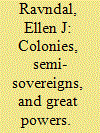

|
|
|
|
|
| Summary/Abstract |
How did the transition from a world of empire to a global international system organised around the sovereign state play out? This article traces the transition over the past two centuries through an examination of membership debates in two prominent intergovernmental organisations (IGOs). IGOs are sites of contestation that play a role in the constitution of the international system. Discussions within IGOs reflect and shape broader international norms, and are one mechanism through which the international system determines questions of membership and attendant rights and obligations. The article reveals that IGO membership policies during this period reflected different compromises between the three competing principles of great power privilege, the ‘standard of civilisation’, and universal sovereign equality. The article contributes to Global IR as it confirms that non-Western agency was crucial in bringing about this transition. States in Africa, Asia, and Latin America championed the adoption of the sovereignty criterion. In this, paradoxically, one of the core constitutional norms of the ‘European’ international system – the principle of sovereign equality – was realised at the hands of non-European actors.
|
|
|
|
|
|
|
|
|
|
|
|
|
|
|
|
| 2 |
ID:
171917
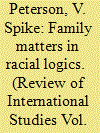

|
|
|
|
|
| Summary/Abstract |
This article seeks to advance our understanding of how intimate relations and racial logics are co-constituted and matter – subjectively, culturally, materially, and politically – in our colonial present of economic inequalities, nationalist populisms, anti-migrant discourses and xenophobic hostilities. Addressing these crisis conditions is urgent, yet critical interventions indicate that prevailing accounts inadequately address the scale, complexity, and fluidity of racisms operating today. This article proposes to think racial logics ‘otherwise’ by drawing on interdisciplinary scholarship and intersectional analytics to produce a genealogy of state/nation formation processes, imperial encounters, and legitimating ideologies that illuminates how ‘intimacy builds worlds’.1 A deep history of political centralisation reveals that regulation of intimate, familial relations is a constitutive feature of successful state-making and crucial for understanding how modernity's ‘race difference’ is produced and how the racialisation of ‘Other’ (‘non-European’, undesirable) sexual/familial practices figures in contemporary crises. Locating intimate relations – ‘family’ – in (birthright) citizenship, immigration regimes, and political-economic frames helps clarify the amplification of global inequalities and the power of stigmatisations to fuel nationalist attachments and anti-migrant hostilities. Foregrounding intimacy and integrating typically disparate lines of inquiry advances our analyses of today's often opaque yet intense racisms and their globally problematic effects.
|
|
|
|
|
|
|
|
|
|
|
|
|
|
|
|
| 3 |
ID:
171921


|
|
|
|
|
| Summary/Abstract |
Refugees are often considered as a source of disorder if not fundamental threat to international society. In contrast, and drawing from an English School approach, this article argues that the figure of the refugee is foundational to the constitution of both modern international society and its agent, the sovereign territorial state; hence refugee protection represents a primary institution of international society. Starting with conceptual and methodological considerations for studying primary institutions, the article then highlights the longstanding and widespread state practice of granting asylum. It is shown that on the one hand, the figure of the refugee serves to consolidate and naturalise the nation/state/territory trinity underpinning the modern state system; and on the other hand, protecting refugees plays a central role in the construction of statist self-identities as liberal, humanitarian, and altruistic agents. The last section of the article turns to the politics of contestation of refugee protection, examining domestic, regional, and international reactions to ‘anti-refugee’ policies in the United States, Hungary, and Australia. The considerable amount of criticism generated by these restrictive policies, it is argued, evidence the enduring importance and relevance of refugee protection in (and for) international society.
|
|
|
|
|
|
|
|
|
|
|
|
|
|
|
|
| 4 |
ID:
171920
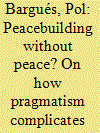

|
|
|
|
|
| Summary/Abstract |
The International Relations (IR) literature has strongly criticised the invasive and top-down nature of liberal peace, facilitating a reinterpretation of the practice of international intervention in conflict-affected societies. Today, sustaining peace policy approaches advance longer-term missions, give a secondary role to external practitioners, and increasingly accept risks and failures. What is striking is that even when these policy discourses hold out the promise of liberating peacebuilding from dominant and top-down models of liberal intervention, the mood in the field is one of despair. By drawing on John Dewey's work on pragmatism and interviewing practitioners in Bosnia and Kosovo, the article reflects on the morass practitioners find themselves, diagnoses the source of the frustrations, and anticipates the direction of sustaining peace. Pragmatism adumbrates the idea of ‘peacebuilding without peace’, encouraging practitioners to experiment, give primacy to their doings and explore this world without hope of success and dreams of otherworldliness.
|
|
|
|
|
|
|
|
|
|
|
|
|
|
|
|
| 5 |
ID:
171919
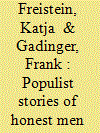

|
|
|
|
|
| Summary/Abstract |
This article proposes the methodological framework of visual narrative analysis through the study of images and narratives. We are interested in the appeal of political storytelling. In applying an approach of layered interpretation, we study images and slogans to consider the more complex underlying narratives in their political and cultural context. Our exploratory case studies draw on material from right-wing populist parties, namely election campaign posters from Germany and the UK as material for the analysis. We find that narratives operate with a ‘fantasmatic logic’, which adds fantasy to politics, to depoliticise and camouflage their radical intent and gain approval by making consent desirable. We identify two exemplary narratives (honest men under threat; proud mothers) that entrench traditional gender roles in accordance with patriarchy and nationalism. Theoretically, our approach contributes to debates in IR on cultural underpinnings in international politics and the construction of collective identities through shared/divided narratives. Visual narrative analysis provides a promising methodological tool for analysing visual representations in their productive relationship with text. This perspective foregrounds the power of political storytelling through fantasmatic appeal and fosters a better understanding of the global rise of populism.
|
|
|
|
|
|
|
|
|
|
|
|
|
|
|
|
| 6 |
ID:
171918
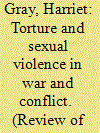

|
|
|
|
|
| Summary/Abstract |
Despite the wide repository of knowledge about conflict-related sexual violence that now exists, there remains a lack of understanding about how victims/survivors of such violence themselves make sense of and frame their experiences in conversation with global and local discourses and with the categorisations that underpin support programmes. Such sense-making is important not only because the ways in which violence is categorised shape a victim/survivor's ability to access particular forms of recognition and support, but also because it is central in how shattered selves and worlds are remade in the aftermath of violence. Drawing on individual and group interviews conducted with refugees living in Kampala, Uganda, this article charts how framings of ‘torture’ and ‘sexual violence’ become meaningful in participants’ accounts in the (re)formation of themselves as subjects after violent victimisation. We trace how participants navigate the heteronormative societal and legal norms that shape their subjectivity and the effects of the violence they experienced through the deeply gendered and political work that these terms do in their narratives. Our analysis thus highlights and reminds us to pay attention to the political stakes involved in fluid processes of categorising injury.
|
|
|
|
|
|
|
|
|
|
|
|
|
|
|
|
|
|
|
|
|